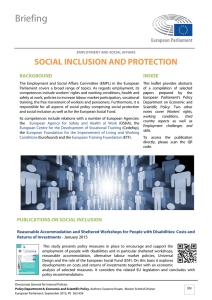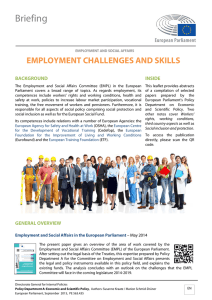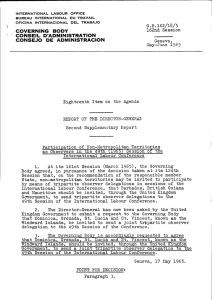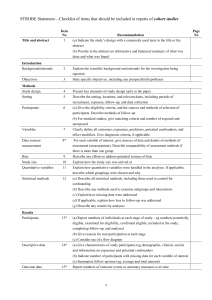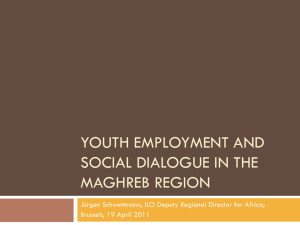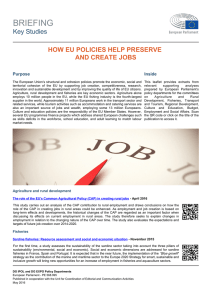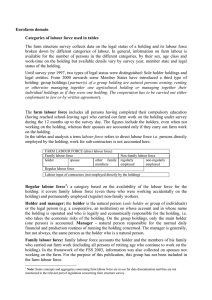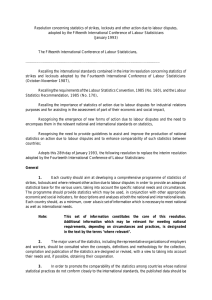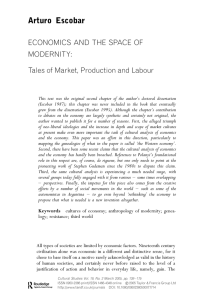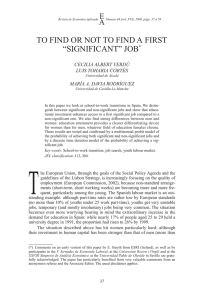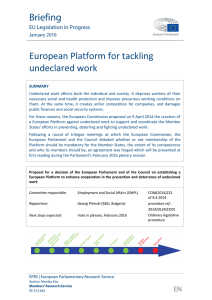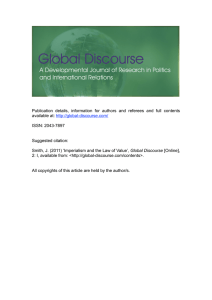Workers` Rights, Working Conditions, Third Country and Member
Anuncio
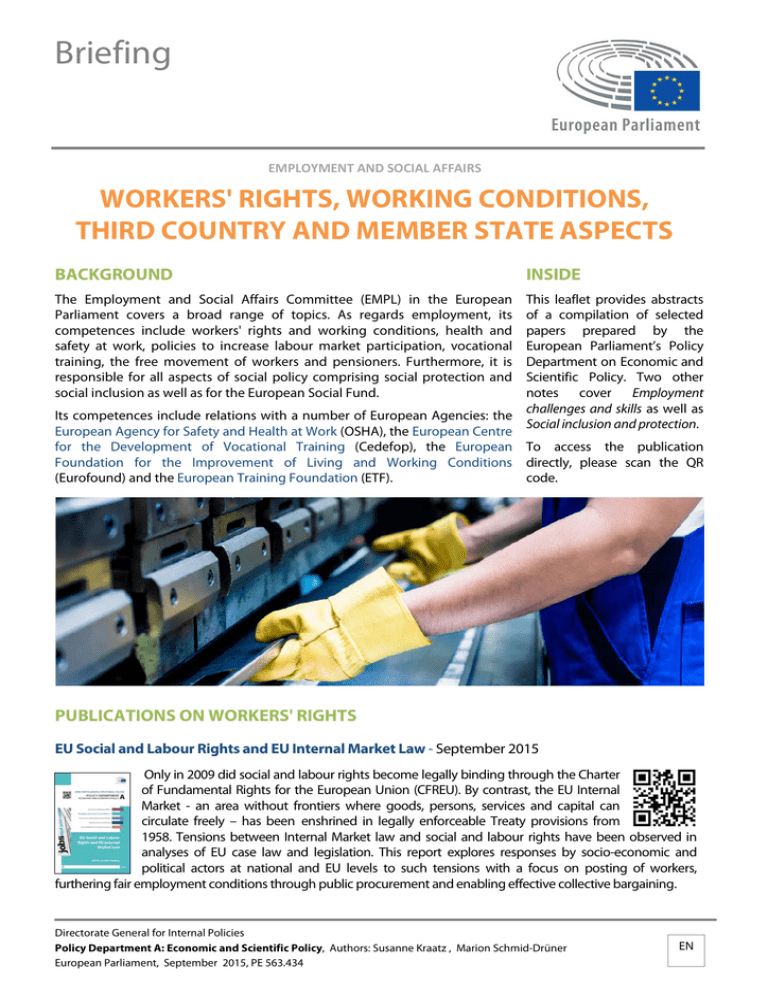
Briefing EMPLOYMENT AND SOCIAL AFFAIRS WORKERS' RIGHTS, WORKING CONDITIONS, THIRD COUNTRY AND MEMBER STATE ASPECTS BACKGROUND INSIDE The Employment and Social Affairs Committee (EMPL) in the European Parliament covers a broad range of topics. As regards employment, its competences include workers' rights and working conditions, health and safety at work, policies to increase labour market participation, vocational training, the free movement of workers and pensioners. Furthermore, it is responsible for all aspects of social policy comprising social protection and social inclusion as well as for the European Social Fund. This leaflet provides abstracts of a compilation of selected papers prepared by the European Parliament’s Policy Department on Economic and Scientific Policy. Two other notes cover Employment challenges and skills as well as Its competences include relations with a number of European Agencies: the Social inclusion and protection. European Agency for Safety and Health at Work (OSHA), the European Centre for the Development of Vocational Training (Cedefop), the European To access the publication Foundation for the Improvement of Living and Working Conditions directly, please scan the QR (Eurofound) and the European Training Foundation (ETF). code. PUBLICATIONS ON WORKERS' RIGHTS EU Social and Labour Rights and EU Internal Market Law - September 2015 Only in 2009 did social and labour rights become legally binding through the Charter of Fundamental Rights for the European Union (CFREU). By contrast, the EU Internal Market - an area without frontiers where goods, persons, services and capital can circulate freely – has been enshrined in legally enforceable Treaty provisions from 1958. Tensions between Internal Market law and social and labour rights have been observed in analyses of EU case law and legislation. This report explores responses by socio-economic and political actors at national and EU levels to such tensions with a focus on posting of workers, furthering fair employment conditions through public procurement and enabling effective collective bargaining. Directorate General for Internal Policies Policy Department A: Economic and Scientific Policy, Authors: Susanne Kraatz , Marion Schmid-Drüner European Parliament, September 2015, PE 563.434 EN Policy Department A: Economy and Scientific Policy Collection of Key studies Discrimination of Migrant Workers at the Workplace – April 2014 Although EU legislation is in place, statistics indicate that migrant workers (EU nationals and non-EU nationals) are discriminated in the EU labour market. This note discusses the legal framework protecting migrant workers against discrimination and takes a closer look at the types of discrimination foreignborn workers may face in the workplace. It concludes with a summary of current opinion as to whether action is warranted to prevent migrant employment discrimination in the EU, and providing some best-practice examples. The Role and Activities of Employment Agencies – June 2013 This study provides an overview of the activities of employment agencies as well as their legal framework (WTO, ILO, EU) in the EU Member States and closely examines their role in selected countries. It focuses on temporary work agencies, a significantly growing market within the EU. Four identified market types (market driven, social dialogue based, legislator driven and emerging markets) are analysed through country cases regarding national regulations, the treatment of workers and everyday functioning of the agencies. It becomes evident that there is a wide diversity of the branch to take account of when reviewing the EU Directive on Temporary Agency Work (2008/104/EC). Social Protection Rights of Economically Dependent Self-Employed Workers – May 2013 The study analyses the role of economically dependent self-employed workers with a view to labour law and social protection rights. In addition to setting out the reasons for the increase of dependent self-employed workers, the authors provide case studies across various sectors of selected EU Member States. While the phenomenon of dependent self-employment is highly diverse across EU Member States, it has become increasingly important and can be regarded as part of a general trend towards labour market flexibilisation. Enforcement of Fundamental Workers’ Rights – August 2012 This study provides an overview of international and European law regulating a selection of fundamental workers’ rights (freedom of association and the right to collective bargaining, non-discrimination on grounds of age, the right to health and safety at work). It then analyses their enforcement in seven Member States (France, Greece, Hungary, Italy, Sweden, Netherlands and United Kingdom). Based upon these findings, it explores possible ways forward for improved enforcement of fundamental workers’ rights in the European Union in the context of the crisis and in the longer term. PUBLICATIONS ON WORKING CONDITIONS Employment Conditions in the International Road Haulage Sector - March 2015 The study analyses recent trends in the employment conditions of drivers. In particular, it aims to review whether the current regulatory framework including the Posting of Workers Directive is achieving the desired balance between market integration and social protection of workers, and what steps can be taken to ensure this balance in the future. The present report follows on from a previous study commissioned by the European Parliament in 2013. WORKERS' RIGHTS, WORKING CONDITIONS, THIRD COUNTRY AND MEMBER STATE ASPECTS September 2015 Policy Department A: Economy and Scientific Policy European Platform to Enhance Cooperation in the Prevention and Deterrence of Undeclared Work - October 2014 Following an overview of evidence on undeclared work, this document presents core elements of the Commission proposal on the establishment of a European network against undeclared work, views of the European Parliament and the social partners. The briefing concludes with an analysis of related European networks and factors enhancing the effectiveness of mutual exchange. Occupational Health Concerns: Stress-Related and Psychological Problems Associated with Work – May 2013 The study presents recent trends on stress at work as well as an overview of EU and national measures to tackle this problem, especially in the context of the economic and financial crisis. The report also includes a number of case studies illustrating initiatives that have proven successful in improving workers’ mental well-being, in particular during restructuring. Given the growing concerns on the impact of the economic and financial crisis on workers’ mental health, one of the main recommendations put forward in the study is that the next Strategy, or any other relevant European framework on occupational health and safety, should include stress at work as a priority area. PUBLICATIONS ON THIRD COUNTRY AND MEMBER STATE ASPECTS The State of EU-Switzerland Relations in the EMPL Areas of Responsibility - December 2014 After giving a background on the EU-Switzerland relations, namely the agreement on the free movement of persons, the note discusses the repercussions of the referendum to introduce quotas of February 2014. Furthermore, it specifies which negotiations with Switzerland are on-going, such as on the Croatia protocol and the new institutional framework between the EU and Switzerland. The Transatlantic Trade and Investment Partnership (TTIP) and Labour - November 2014 This briefing focuses on labour provisions in the Transatlantic Trade and Investment Partnership (TTIP). After a summary of its scope, state and the involvement of the European Parliament, it analyses the evolution of labour provisions in trade and investment agreements with a view to similarities and differences in the EU and US approaches. Finally, it presents a number of employment-related issues as well as selected results from research on potential job effects. The Russian Embargo: Impact on the Economic and Employment Situation in the EU - October 2014 The note summarises EU sanctions and Russia's retaliatory measures. It analyses the impact on economy and employment, compensation measures taken by the European Commission as well as initiatives by the European Parliament. WORKERS' RIGHTS, WORKING CONDITIONS, THIRD COUNTRY AND MEMBER STATE ASPECTS September 2015 Policy Department A: Economy and Scientific Policy Collection of Key studies Youth Unemployment in Greece: Situation before the Government Change - June 2015 The briefing note analyses the development of youth unemployment and of NEET youth (Neither in Employment, Education, Training) in Greece in a comparative perspective (Cyprus, Ireland, Portugal, Spain). It describes its specific features and gives an overview of national and European policy initiatives with a view to the implementation of the Youth Guarantee. Youth Unemployment and the Skills Mismatch in Denmark - March 2015 The paper analyses the labour market situation in Denmark with a focus on youth unemployment and related policy measures. It furthermore presents data on future skills mismatch and the various Danish reforms to tackle the challenge of a rising demand for highly skilled workers. Finally it discusses some policy lessons that can be drawn from the Danish experience. Social and employment situation in Italy - March 2014 Due to its structural weaknesses Italy is one of the EU28 Member States worst hit by the crisis. The delegation note gives an overview of the labour market situation focusing on the marginalization of specific segments of the working population, in particular women and young people, and especially those residing in Southern regions. Furthermore, it presents labour market and social protection reforms having been introduced since 2011 UPCOMING PUBLICATIONS Information and consultation of public sector workers - At a glance How to mainstream the social scoreboard into macroeconomic surveillance - Study Employment and social situation in Greece, Portugal, the Netherlands - In-depth analyses CONTACTS MONTHLY HIGHLIGHTS Policy Department A - Economic and Scientific Policy ECON - ENVI - EMPL - IMCO - ITRE - TAXE poldep-economy-science@ep.europa.eu The Monthly highlights provide an overview of the on-going work of the policy departments. To receive this publication send an email to: POLICY DEPARTMENTS Ep-policydepartments@ep.europa.eu The five policy departments are responsible for providing - both in-house and external - high-level independent expertise, analysis and policy advice at the request of committees and other parliamentary bodies. They are closely involved in the work of committees which they support in shaping legislation on and exercising democratic scrutiny over EU policies. Policy departments deliver policy analysis in a wide variety of formats, ranging from studies and in-depth analyses to briefings and the Fact Sheets on the EU. SUPPORTING ANALYSES Access all publications produced by the Policy Departments. All publications: www.europarl.europa.eu/supporting-analyses Disclaimer The content of this document is the sole responsibility of the author and any opinions expressed therein do not necessarily represent the official position of the European Parliament. It is addressed to the Members and staff of the EP for their parliamentary work. Reproduction and translation for non-commercial purposes are authorised, provided the source is acknowledged and the European Parliament is given prior notice and sent a copy. ISBN: 978-92-823-7923-3 (paper) ISBN: 978-92-823-7924-0 (pdf) doi:10.2861/329438 (paper)/doi:10.2861/12437 (pdf) Catalogue: QA-01-15-613-EN-C; QA-01-15-613-EN-N © European Union, 2015
